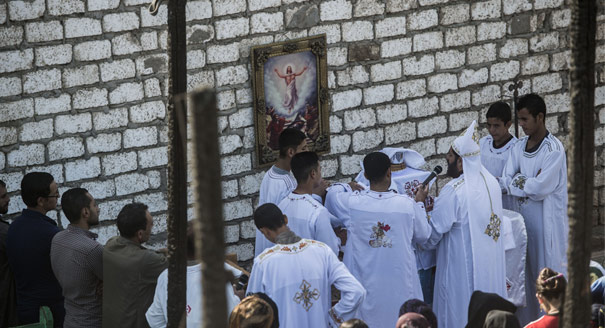At the end of August the Egyptian parliament passed a law on the construction and restoration of churches. It is the first law to regulate such construction, which was previously governed by vague rules based on administrative decisions issued in the 1930s, and that placed many restrictions on church building. Despite hopes that the new law would change things, in reality it reflects the same approach that has for decades governed relations between the state and the Coptic community.
Since the time of President Gamal Abdel Nasser in the 1950s, ties between the Egyptian state and the Copts passed through the institution of the Coptic Orthodox Church. The regime has always treated the church as the sole representative of the Copts, rather than dealing with members of the community as full citizens in their own right. In exchange the church has offered its political support to the regime. Within this framework, the number of churches built annually has often been the outcome of a bargaining process between the political authorities and the church leadership.
Since the 1970s, the construction of churches has been among the main sources of religious tension between Christians and Muslims in Egypt. As many of their requests to build churches were ignored, Christians opted to do so without legal permission. However, this move often angered their Muslim neighbors, who viewed it as a violation of the law and an attempt to impose facts on the ground. In many cases the ensuing tensions between the communities led to sectarian clashes.
After the downfall of President Hosni Mubarak on January 25, 2011, many Copts thought that a new democratic regime would guarantee their rights as citizens, including their religious rights. Hoping to end the monopoly of the church over the Coptic community, a group of intellectuals, lawyers, and human rights activists who were part of the National Council for Human Rights submitted a draft law to the government for regulating the building of places of worship. They rejected the idea of a law that involved only Christians, preferring one that governed the construction of both mosques and churches. However, the Supreme Council of the Armed Forces, which ruled Egypt from February 2011 to June 2012, and the Muslim Brotherhood, whose candidate Mohammed Morsi won the presidential election in June 2012, ignored the matter and continued to operate according to the old rules.
After Morsi was ousted from power in July 2013, the committee charged with writing a new constitution included an article asking the forthcoming parliament to issue a law to regulate the construction and renovation of churches. That is the draft that was passed in August. While the aim was to grant Copts their rights as citizens, the process only reaffirmed that the state would deal with the community in the long-established way. In negotiating the draft law, the government treated the Coptic Orthodox church, together with the Catholic and Evangelical Churches, as the political representative of Egypt’s Christians. The government sent the draft law to parliament after several rounds of negotiations between church representatives and the government, without any public debate taking place. When the draft law was finally discussed in parliament, its critics, both inside and outside parliament, were silenced under the pretext that the churches had already agreed to the law, as if it were exclusively a church matter.
The law itself reproduced many of the old habits that had previously governed the construction of churches. Those who drafted it insisted on using the term “religious sect” instead of “Egyptian Christian citizens” in their text, once again treating the Copts as part of a corporate entity. The draft specified that the size of a church seeking a permit for construction should be proportionate to the number and need of Christians in the area, a condition that can be used to place restrictions on church construction.
Another key idea was also changed. In the draft prepared after the removal of Mubarak, there was a clause stating that if the state did not respond within 60 days to an application for the construction of a church, it would automatically be considered approved. However, the new draft asked only that the authorities respond to an application within four months, but said nothing about what would happen if there was no response.
The new law will not likely solve the problem of church building in Egypt. On the contrary it might aggravate it. If Christians are not allowed to build churches, then we are likely to go back to the days when they did so without permission, heightening Muslim anger. In order to ensure the religious rights of Egypt’s Christians, and also to put an end to religious tensions between Muslims and Christians over the building of churches, the Egyptian government must adopt new rules to grant Copts their rights as citizens to build places of worship. Fitting new legislation in discredited old bottles will only make matters worse.






